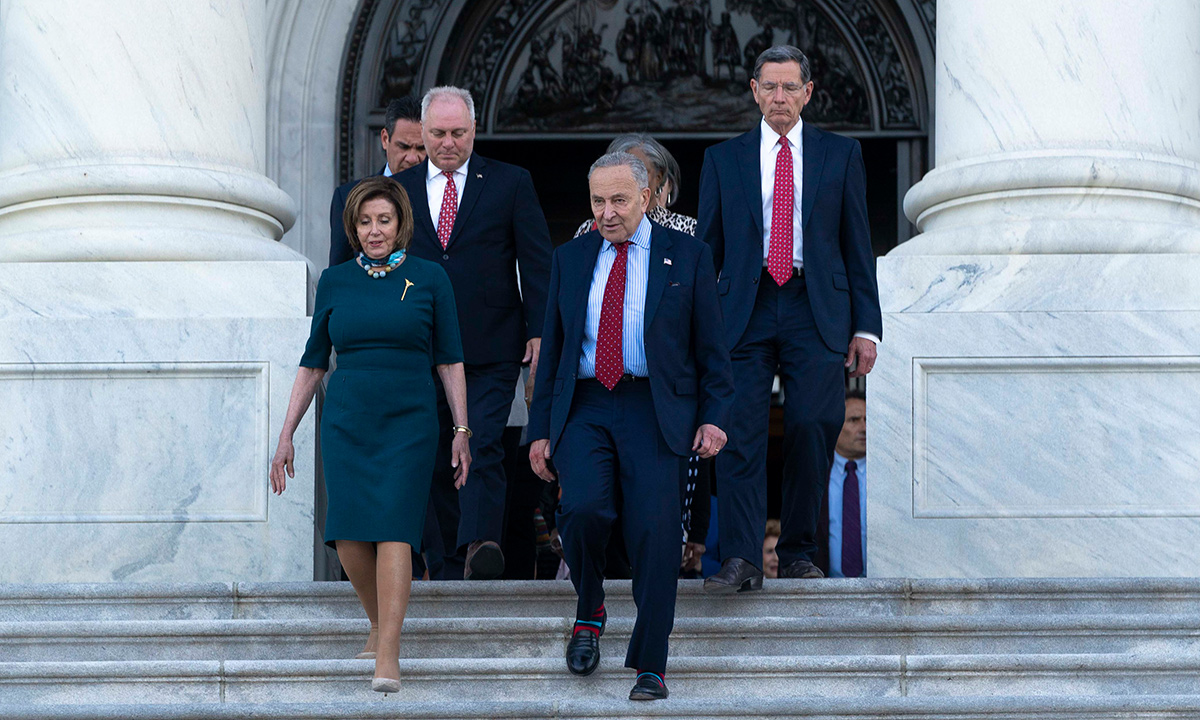July 19, 2021
Schumer’s Ready-Fire-Aim Infrastructure Strategy


On June 24, a bipartisan group of 20 Senators and President Biden reached an agreement on a $1.2 trillion bipartisan infrastructure plan. The legislative path forward for that bill has been complicated by House Speaker Pelosi (D-CA) and her insistence on a reconciliation bill implementing key elements of President Biden’s Jobs and Families plans.
The day the bipartisan deal was announced, Senate Majority Leader Schumer (D-NY) stated, “Our plan continues to have a budget resolution and a bipartisan bill on the floor of the Senate in July. Everyone in our caucus knows you can’t do one without the other.” For Pelosi and Schumer, linking the bipartisan infrastructure bill with a partisan reconciliation bill strengthens Democratic support for both measures, particularly among progressives dissatisfied with the bipartisan deal. For Biden, linking votes on infrastructure to trillions in additional spending reduces GOP support for all of the above, and jeopardizes prospects for both packages particularly in the Senate.
Well, as I said, there won’t be an infrastructure bill unless we have a reconciliation bill, plain and simple. In fact, I use the word ‘ain’t.’ There ain’t going to be an infrastructure bill unless we have the reconciliation bill passed by the United States Senate.
Speaker Pelosi (D-CA), June 24
On July 13, 2021, Senator Schumer and Budget Committee Democrats reached an agreement on a budget resolution generating a $3.5 trillion reconciliation bill. On July 15, after stating “Everyone has been having productive conversations and it’s important to keep the two-track process moving,” Schumer effectively put all Senate infrastructure negotiations on a shot-clock. He plans to file cloture on the legislative vehicle for a bipartisan infrastructure bill on July 19, setting up an initial procedural vote on July 21. Schumer set the same deadline for Senate Democrats to agree on a budget resolution clearing the path for their reconciliation spending deal.
This “Ready-Fire-Aim Strategy” is a bold maneuver. Schumer is “Ready.” With his $3.5 trillion reconciliation agreement, he has confidence in the 50 votes needed to take the first concrete step toward implementing that objective—a Senate budget resolution with reconciliation instructions.
“Fire” is next because Schumer pulled the trigger starting this process before taking “Aim.” That isn’t possible until the details of both the bipartisan infrastructure plan and the reconciliation bill (unlikely before September) are finalized. A limited legislative calendar (the House is scheduled to be in recess all of August and half of September and October) complicates matters. Whatever happens next week, precedent and history suggest that the size of any reconciliation package adopted this year shrinks before it reaches the President’s desk.
The political stakes are high. The procedural votes in the Senate impact not only the prospects for trillions in potential infrastructure spending but also negotiations on a two-year budget cap, federal debt limit extension agreement, needed to avoid a government shutdown, complete action on FY22 appropriations, and avoid a potential default on U.S. debt obligations.
President Biden, Schumer, Pelosi, Senator Manchin (D-WV), Senate Republican Leader McConnell (R-KY), and key Republican negotiators on the bipartisan plan like Senators Portman (R-OH) and Romney (R-UT) know that long overdue action on infrastructure has strong bipartisan support.
This two-track infrastructure strategy is designed to protect the interests of progressives. The challenge for Schumer, Pelosi, and President Biden is that without support from Manchin and other moderates, progressives lack the votes needed to pass their agenda in the Senate and the House (after the special election in Texas, Democrats will have a three-vote margin in the House).
That makes the Senate vote on a budget resolution greenlighting a $3.5 trillion reconciliation bill the first critical test for the Schumer-Pelosi reconciliation strategy. Failure to pass a budget resolution makes the bipartisan bill the only infrastructure game in town. That’s not an acceptable outcome for Schumer, Pelosi, President Biden, or Senator Manchin because it gives Speaker Pelosi little incentive to schedule House votes on the bipartisan infrastructure bill.
With confidence about the outcome of this key Senate test vote, Schumer is “Ready” to roll the dice.
FORECAST
75% | Before the August recess, Senate Democrats pass a budget resolution with reconciliation instructions